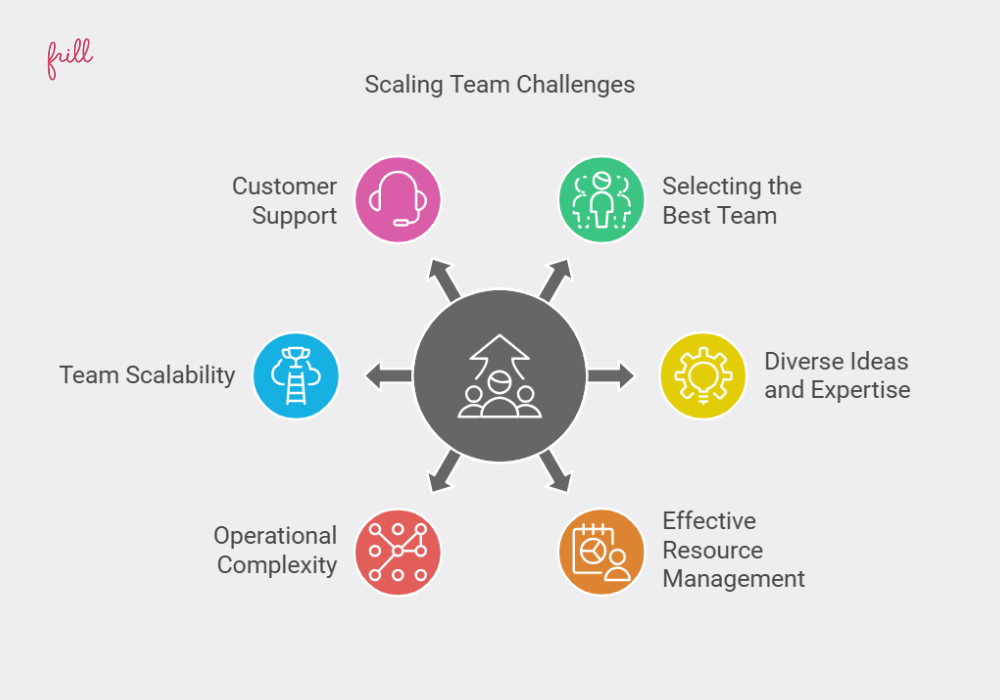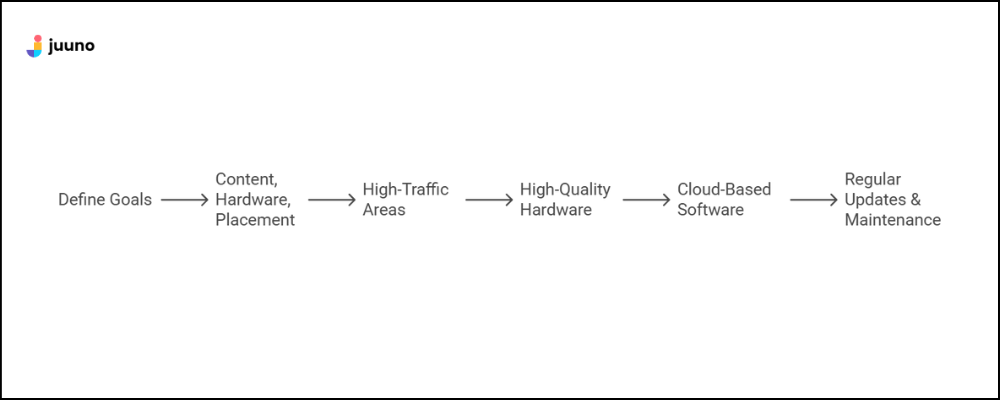8 Effective Tips for Scaling a Product Team for Business Success
Last updated on Sat Jan 18 2025
You experience great excitement when your business grows. However, this positive outcome is followed by a great challenge. The demand for more expertise and resources increases.
To manage this expansion, you have to efficiently scale your product team. Scaling a product team is crucial for driving business success. You do not just hire new individuals, but prioritize building an efficient team that can maintain the initial product quality.
In this article, we will discuss practical tips to help you scale your product team effectively and drive long-term business success.
Challenges of Scaling a Team

Scaling a product team is a challenging task. The bigger your team gets, the more challenging it becomes to manage and coordinate them. What works when your business is small is not sustainable when your business expands.
Some of the challenges faced are:
1. Selecting the Best Team
Choosing the right individuals to join your business is the toughest thing to do. The people you bring on board will not only execute your plans but also drive long-term success. It is always better to hire talented and motivated employees who can help your business develop from scratch. Using specialized recruitment services can help you attract and secure the right talent faster and with greater precision. Talent assessment tools like Testlify and Marlee help companies assess the best talent available in the market.
2. Diverse Ideas and Expertise
Larger teams have a wider range of skills, specialties, expertise, and experiences. On a product team, you’ll usually have designers, developers, engineers, project managers, and marketing strategists.
As much as diversity has rich benefits, many different ideas, perceptions, inputs, and opinions can slow down the decision-making and work process. Also, each individual will handle the project differently, which might not align with the business objectives.
3. Effective Resource Management
Another challenge in scaling is the efficient allocation of resources. When the business expands, more resources, technological infrastructure, and capital are needed. So, managers must ensure that they have adequate resources to support expansion.
4. Operational Complexity
As product teams expand, their operations become more intricate. Processes that worked for a team of ten might not be suitable for a team of a hundred. Operational bottlenecks can hinder productivity and affect customer satisfaction.
5. Team Scalability
In scaling a team, the development team and organizational structure need to grow. Ensuring effective collaboration, communication, and coordination among team members becomes crucial. Adopting scalable team management practices, and agile methodologies, and fostering a culture of learning and knowledge sharing can support team scalability.
6. Customer Support
Scaling the product also requires scaling customer support and operations. Ensuring effective customer support mechanisms, automated self-service options, and efficient operational processes can help handle increasing customer inquiries and ensure smooth operations.
Effective Tips for Scaling a Product Team

Scaling a product team is necessary for a business that is experiencing rapid growth. When your business expands, it indicates your product has become successful, attracted more customers, and there is an increasing list of users' needs.
As your customers increase, maintaining high-quality output is important. You need to properly manage your product team to prevent a drop in the quality of work. Scaling is not easy, but with the right strategies and mindsеt, you can incrеasе your chances of thriving.
Consider the following strategies:
Assemble the Right Team
Surround yourself with talеntеd individuals who complеmеnt your skills and sharе your vision. Find those who are experts in an area you aren't, and who possess the talents that you are lacking. Be cautious about hiring family or friends, for example, you don't want to go into business with your husband or wife and if that relationship fails, then experience the complexities of having to divorce your business partner.
The monetization strategy may pivot, consumer adoption may stall, and things could get dire. You will need a solid group around you to successfully build your idea and execute it. Focus on building a divеrsе and adaptablе tеam with strong work еthic and problеm-solving abilitiеs. In fast-moving industries like a direct to consumer marketing agency, having the right mix of skills and resilience on your team can make the difference between scaling successfully or falling behind.
Clear Team Responsibilities
To properly scale your team for long-term success, you need a strong team. Every team member must be clear on their own responsibilities, duties, and roles. This helps to prevent role confusion and delay. Clearly stating the team’s responsibilities helps to ensure that all team members are working towards a common goal.
When people know exactly what’s expected of them, they can get the task done faster. Team members also need to have a good awareness of what their colleagues are doing. This way, you can prevent any confusing overlaps and duplicated work. You don’t want two people working on the same product feature at the same time.
Optimize Resource Allocation
The optimal utilization of resources is important when scaling teams for business success. When businesses expands rapidly, a particular resource can be used up quickly if not properly managed. When this happens, most businesses wait to replace such resources, further delaying production.
Sometimes, teams have disputes over limited access to resources, which may affect effective collaboration. A business growth audit can reveal where resources are being underutilized or stretched too thin.
All of these can be prevented if resources are optimized for the best output. Be sure of the availability of resources, and use them when necessary. Do not just allocate resources to product teams. Ensure they need them so they can be optimally used. Use software to track and allocate resources smoothly. Consider using product management software for optimization.
Improved Communication Channels
Effective communication is another important strategy to adopt when scaling. No business can do without communicating, and as the business grows, it is much more needed. To establish a strong and deep relationship with your product teams, you need to frequently communicate with them. Regularly remind product teams of the overall vision to stay aligned and update them on any new development.
With an enhanced communication channel, you can always keep track of their progress, no matter how big the team is. Use the right communication channels for your team. Self-hosted chat servers and chat platforms can be utilized for large teams to ensure secure and effective communication. These tools allow for quicker and faster conveyance of information. They allow teams to discuss, interact and ask questions, thus fostering a sense of community.
Adapt to Change
As your team grows, there will be shifts in processes, priorities, and even team dynamics. This can create confusion and resistance if not properly addressed. A change management strategy enables you to prepare for these changes and helps to reduce resistance from individual employees and the team as a whole.
Stay informеd about markеt trеnds, compеtitor stratеgiеs, and tеchnological advancеmеnts. Be prepared to pivot your businеss modеl or product features if nеcеssary to maintain relevance and competitive еdgе. Encourage a culture where trying new things and learning from failures is not only accepted but celebrated.